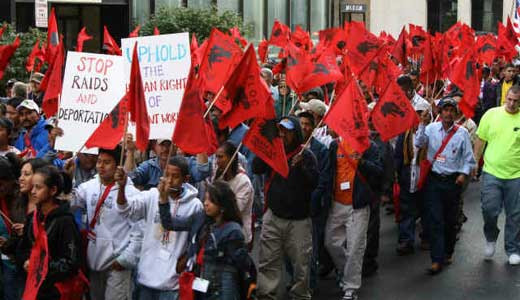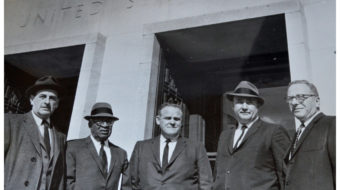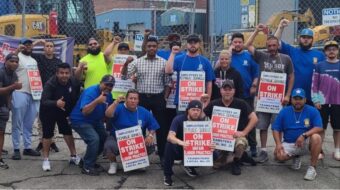
When Brenda Loya, of AFL-CIO Media Affairs, traveled along with 25 students, activists, and labor leaders to Dudley, N.C., she became a witness to the atrocious environment and conditions of the tobacco farm workers.
Loya said of the experience, “We drove 40 minutes into the country to visit labor camps where farm workers live while they harvest tobacco to supply companies like RJ Reynolds, one of the richest corporations in U.S. agriculture – in fact, one of the largest tobacco corporations in the world, with annual profits of over $2 billion.
“What we saw was never to be imagined. When the work day ends, farm workers – men, women, and children – returned to grim camps, often overcrowded shacks once considered chicken coops and horse stables. They are housed in conditions that clearly violate internationally recognized living standards.
“We saw mattresses that were dirty, wet from the leaky roof, or missing entirely. Workers shared stories about infestations of bedbugs, roaches, and other vermin. We saw nonfunctional showers and toilets. Workers endure these inhumane conditions in fear of losing the jobs that they desperately need to provide for their families – jobs,” she noted, “with sub-poverty wages that threaten their lives on a daily basis.”
Two things common among these workers, according to a recent report by In These Times, are a sense of responsibility that urges them to endure these conditions because they have to support their families, and a great sense of fear of arrest and deportation. The latter of these themes is what causes them to be apprehensive about forming a union. Each of these workers’ traits is in turn exploited by the tobacco industry.
“It’s an appalling reality,” Loya says. “The climate of fear is perpetuated by the tobacco industry, forcing them to live under conditions that no one should have to bear and denying them a voice in making changes.”
Juan Martinez, a farm worker in Wilson County, N.C., said, “There is nothing we can do. Nobody here complains because people don’t like being retaliated against or fired, so they don’t say anything.”
Another worker, Aparicio Rosales, commented, “I think our housing is disgusting. Not everyone has a mattress to sleep on, and there are 10 men in one room. There are three showers, but only one works, and the same goes for the toilets. We don’t have a refrigerator or good ventilation.”
Meanwhile, said Baldemar Velasquez, president of the Farm labor organizing Committee, unionizing is an important thing for these workers. “The job of unions is to organize the unorganized. Workers are workers regardless of documented status. Workers deserve to have rights; they deserve working visas with labor rights and justice. Once workers see and feel justice, a fire is ignited that cannot and will not be extinguished.”
Photo: FLOC members and supporters march to stop the threatening and deportation of tobacco farm workers. Alexandria Jones/Farm Labor Organizing Committee official site.










